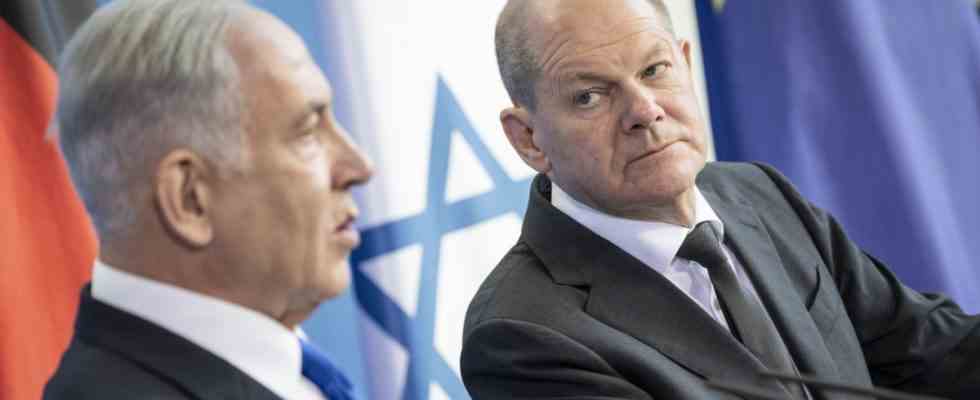Chancellor Olaf Scholz (SPD) warned Israeli Prime Minister Benjamin Netanyahu against dismantling democracy and the rule of law, but at the same time emphasized Germany’s special responsibility for the Jewish state. “It is our wish that our partner in values, Israel, remains a liberal democracy,” Scholz said on Thursday after talks with Netanyahu in Berlin.
However, he made it clear that Germany’s commitment to responsibility for Israeli security, anchored in the coalition agreement between the Ampel parties, will not be affected. “The security of Israel is our reason of state. This federal government stands for that and Israel can rely on that,” he said. Netanyahu rejected criticism of the judiciary reform that his national-religious government pushed through in the face of massive protests. “Israel was, is and will always be a liberal democracy,” he said.
During Netanyahu’s first visit after his re-election as prime minister, Scholz clearly sought a balance between comparatively clear warnings and the emphasis on the unchanged special relationships between Germany and Israel. In the morning, he and Netanyahu visited the “Gleis 17” memorial in Berlin’s Grunewald forest for the approximately 10,000 Jews deported to labor and concentration camps during the Nazi regime. After the crimes committed by the National Socialists, the friendship between Germany and Israel is a “precious gift,” said Scholz. From the past grows a “permanent responsibility for the future”.
Netanyahu defends himself – and tackles the opposition
Scholz also called on Netanyahu with unusual clarity to approach the critics of the judicial reform, who warn of the country drifting into an authoritarian system. “As friends of Israel and partners in democratic values, we are following this debate very closely and, I will not hide it, with great concern,” he said. The independence of the judiciary is a valuable asset. He described President Izchak Herzog’s compromise proposals as “valuable”. In a speech on Wednesday evening, Herzog admitted that changes in the distribution of power between the three powers were necessary. However, this requires a broad consensus.
While the opposition reacted with approval, Netanyahu emphasized once again in Berlin that his government wanted to stick to the plans. They should only restore the balance between the forces. “An independent judiciary is not an all-powerful judiciary,” he said. Israeli judges wield powers unmatched in any other democracy. Netanyahu accused the opposition of not wanting an amicable solution. “There is no desire to find a common solution. There is a desire to find a moment of crisis,” he said. Irrespective of this, Scholz expressed confidence that he “did not want to hold back”. When asked whether Germany’s commitment to Israeli security also applies to a less democratic Israel, he said: “Israel’s security is our reason of state – of course.”
In Berlin, too, critics are demonstrating against the judicial reform
The federal government has been alarmed for weeks about developments in Israel. During the visit of her Israeli colleague Eli Cohen, Foreign Minister Annalena Baerbock (Greens) recognized the protection of the rule of law as one of the connecting elements between Germany and Israel. It was also “always a figurehead of Israel”. She described plans to introduce the death penalty as a “big mistake”. On Thursday there were demonstrations in both Tel Aviv and Berlin – albeit largely out of sight of Netanyahu – against the Israeli judicial reform. Netanyahu’s right-wing religious government intends to implement its plan in a fast-track procedure by the end of the month.
Netanyahu renewed his warnings about the Iranian regime’s nuclear weapons plans during his visit to Berlin. A nuclear-armed Iran poses a danger to Israel and the world. If possible, Israel and its partners want to prevent Iran from becoming nuclear-armed. If necessary, it will also act alone. “Israel will do what it has to do,” he said. Scholz called on Tehran to end its “destructive activities” in the region.
Israel and Germany are concerned that “Iran has taken new escalation steps and has been enriching uranium to a very high degree.” A diplomatic solution has top priority. Israel and Germany want to expand their arms cooperation. Scholz reaffirmed the firm will of Germany, the Israeli air defense system arrow 3 to purchase.

